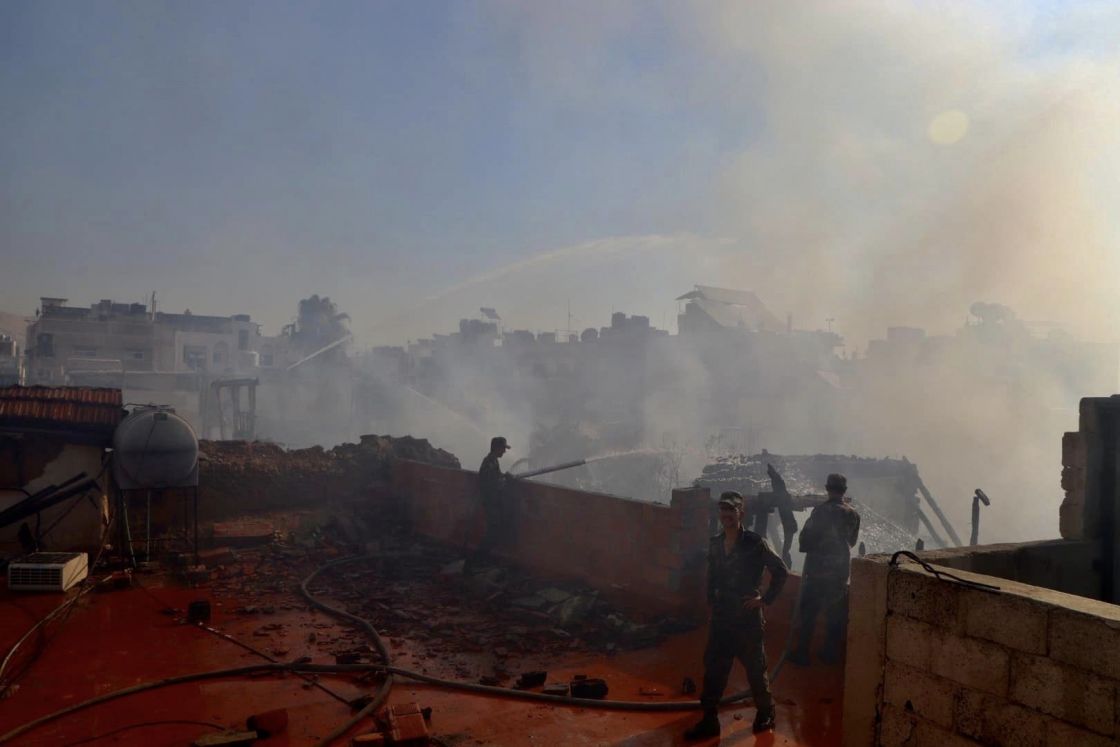- Editorials
- Posted
Kassioun Editorial 1132: Sarouja and the Attempt to Assassinate Syrians’ Spirit!
Sarouja’s tragedy (a fire that burned down a significant part of a neighborhood in Old Damascus on July 16) is being approached from several angles, all of which have in common attempts to overlook the essence of the issue, and even work to cover and hide it.
There are those who reduce the issue to “administrative corruption” and “negligence”, or a “natural disaster”, or go a little further and talk about the commercial interests of the warlords whose profits and “culture” are commensurate with a different Damascus and different Syria, ones without history, identity, or features.
Others deliberately make up stories or get carried away with propaganda about “Iranian interference” and “Shi’ism” and so on. This is far from reality, at least in the concrete example of Sarouja. This discourse is essentially a smoke screen that is required to hide the real stakeholders in the fire, whose “socioeconomic” roots are linked to those who pulled Gourard’s chariot, to Ecochard (a French architect whose projects were responsible for destroying important buildings of Damascus), to the warlords and those who got wealthy from the war, and are also linked to the continuous Zionist perseverance – previously and now – to end Syria once and for all.
Looking at the matter from a wider angle, what happened and is still happening in Syria applies in its stages to the neoliberal method of assassinating countries and peoples. This method goes through three basic stages:
First: the civil state apparatus is gradually eliminated through the elimination of its socioeconomic functions. This is taking place and nearing its end through liberalization, privatization, and lifting subsidies, so that the state apparatus loses its social role that is related to the interests of the majority of people, while retaining its “social-repressive” role that is in the interests of the arrogant, corrupt, plundering few, who are organically linked to the West, regardless of the slogans they chant.
Second: The military function of the state apparatus is being gradually eliminated, by ending the “exclusivity of arms” and devoting a number of “exclusivities” in its place, which is what has been tangibly achieved to a significant extent.
Third: After this and that, assassination of the state apparatus has been completed in principle, and only one obstacle remains before the assassination of the state itself, which is the spirit and culture of the people, or in other words, the cultural nucleus of society. To solve this issue, the proponents of the project to assassinate Syria think that the “reconstruction” portal is the main gateway to this.
This is not surprising. Considering the Lebanese and Iraqi experiences, and others, we can see the practical application of this transition. The Lebanese example of Solidere (a post-civil war construction project that changed significant parts of historical Beirut) alone is sufficient to understand the full picture of the issue.
Preventing the assassination of Syria and its people now inevitably goes through a real political solution – based on UNSC Resolution 2254 – that secures the necessary political will to protect Syria and its people. This is because those who have this will are the 90% of Syrians whom both the regime and the opposition claim to represent, while they have not been asked for their opinion in a truly democratic manner for decades. The political solution, with what it implies in terms of Syrians’ right to self-determination, is the main gateway not only to stop the destruction, but also to unleash Syrians’ voices that are trapped in their chests.
Despite the magnitude of the tragedy and the pain it inflicts on the spirits of Syria and Syrians, a careful look at Damascus’s long history, and Syria’s history as a whole, reveals the extent of the shallowness and arrogance of those (those abroad, primarily the Zionists, and those inside, primarily the corrupt and the extremists), who think that a fire here and a fire there, and a project here and a project there, can assassinate the spirit of Damascus and its people. The truth is that if they manage to burn down all of Damascus, not just one of its neighborhoods, the city would come alive again and toss them into a margin beside one of the many lines of its history. This is what actually happened with many others, who came through and the times swallowed them whole into the abyss of history.


